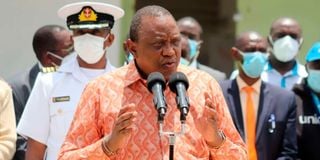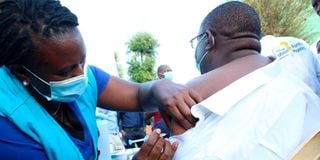Premium
To lift night curfew or not? President’s Catch-22 situation

President Uhuru Kenyatta speaking after flagging off vaccines destined for other parts of the country from the Kitengela depot on Thursday, March 4, 2021.
What you need to know:
- Among the arguments being put forward is that other countries across the world with better health systems are yet to reopen.
- Experts have warned that the country could be staring at a third wave of the virus that could be more devastating.
President Kenyatta is expected to address the nation on Friday when Covid-19 restrictions imposed in January lapse, with sources suggesting the night curfew won’t be lifted yet.
The Head of State’s address, coinciding with one year since the first coronavirus case was reported in the country, is anticipated by most Kenyans keen to know the fate of the curfew enforced between 10pm and 4am since January.
Since the virus struck in March last year, the night curfew has been a constant feature of restrictions imposed to control the spread of the disease, resulting in job losses, destroying livelihoods and causing economic recession for the first time in 20 years.
Owners of businesses, especially bars that now close at 9pm, night travel companies and other enterprises that thrive at night are waiting with bated breath for the President’s communication on the fate of the current Covid-19 restrictions that are set to expire on March 12 after having been extended for a further 60 days in January.
The President’s directives are informed by the advice from the National Emergency Response Committee on Coronavirus and the National Security Advisory Committee.
Full reopening
By last evening, both committees were yet to present their recommendations to the President.
The Nation, however, understands that there is a general agreement among the experts, who advice the President on security matters, that the country is not yet ready for full reopening, particularly lifting of the night curfew.
Among the arguments being put forward is that other countries across the world with better health systems and more effective Covid-19 vaccination roll-outs are yet to reopen.
Furthermore, an analysis of Kenya’s health system has shown that most hospitals are struggling to manage soaring numbers of patients seeking treatment for the disease.
Patients in need of critical care have also doubled while experts have warned that the country could be staring at a third wave of the virus that could be more devastating.
This week, the number of confirmed coronavirus patients surged over 109,000 while those who have died from the virus are well above 1,800.

Ann Boraya, a nurse, administers Covid-19 vaccine to the Covid Taskforce Chairman Willis Akhwale at Mutuini Hospital in Dagoretti South, Nairobi, on March 9, 2021.
Phased reopening
This represents a 1,251 per cent increase in the number of those who have tested positive for coronavirus since Kenya started a phased reopening of the economy in July last year. At that time only 1,800 people had tested positive.
During the same period, the number of deaths has increased by 1,251 per cent from just 160 when President Kenyatta reopened the economy partially on July 6 last year.
It is these circumstances that the President has to weigh before giving Kenyans a way out of a pandemic that has seemingly refused to go away from the world, 16 months since it was first reported in Wuhan, China.
Friday’s briefing will be the 13th presidential address on Covid-19 and the first time since last November that the President will give Kenyans a brief on what his government thinks will be the way forward.
Apart from the curfew, all public events and gatherings including political events are banned. Funerals, burials, and weddings are exempted, but must not exceed 150 persons. Religious meetings are allowed to take place, while public transport is limited to 60 per cent capacity.
Wear masks
Additionally, everyone must wear a mask while in public, while bars, restaurants and other establishments open to the public must close by 9pm. All these protocols while aiding in reducing the pace of the spread of the virus are hurting the economy.
Effect of Covid-19
Although the full effect of Covid-19 on the economy will be known in May when the National Economic Survey is released, the International Monetary Fund has projected that it will shrink by 0.3 per cent.
“Measures to combat the spread of the virus including closure of borders, curfews and closure of some sectors had a huge impact on the economy.
“This includes the scaling down of business operations including manufacturers due to cash flow problems, in turn resulting in job losses,” Kenya Association of Manufacturers Chairman Mucai Kunyiha told the Nation.
By September last year, just five months into the pandemic, Kenya’s unemployment rate had doubled to 10.4 per cent as compared to 5.2 percent in March. During this period, the number of employed individuals shrunk by 1.9 million from 17.8 million to 15.9 million.
Since then, the number of those who have lost their jobs has risen and so has the number of Covid-19 infections and deaths.
To date, almost all countries that instituted some form of lockdown are yet to fully remove their restrictions. In East Africa, it is only Tanzania, which has never fully admitted to the existence of Covid-19 within its borders, and Burundi, which do not have any form of restriction.





